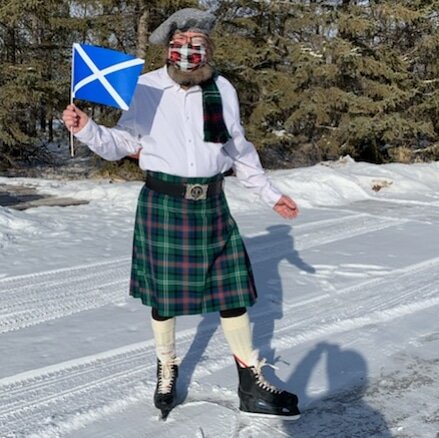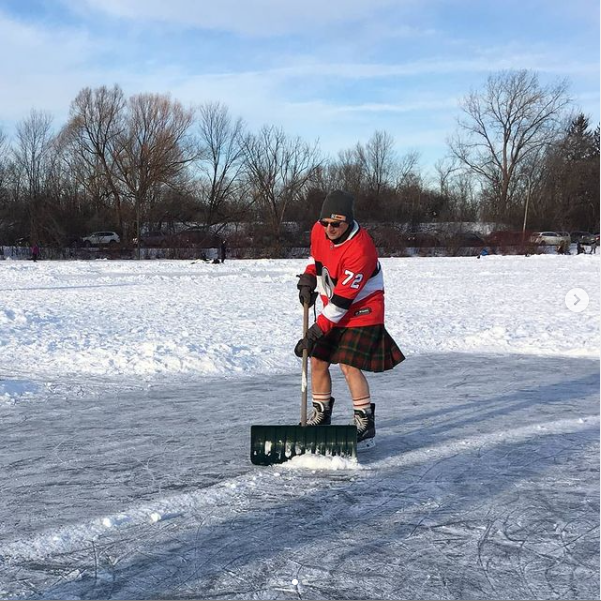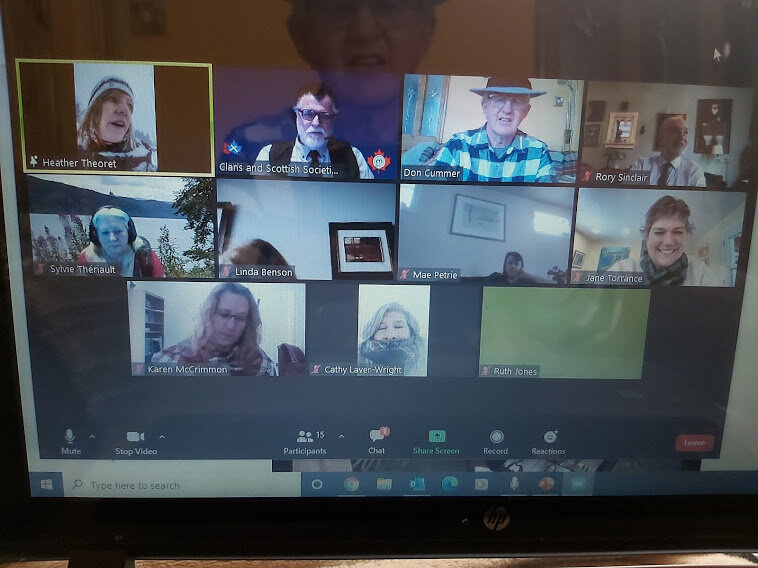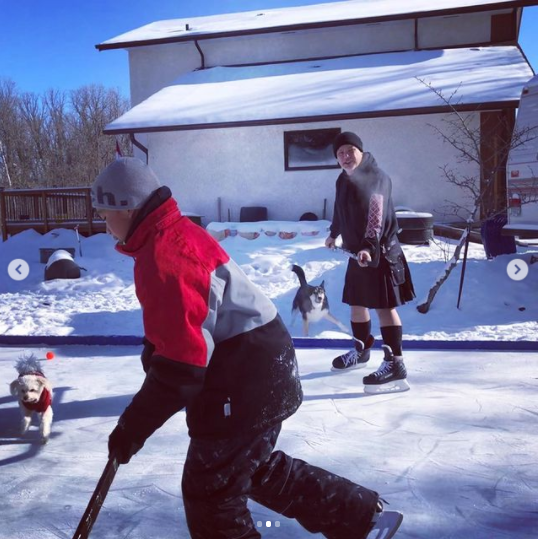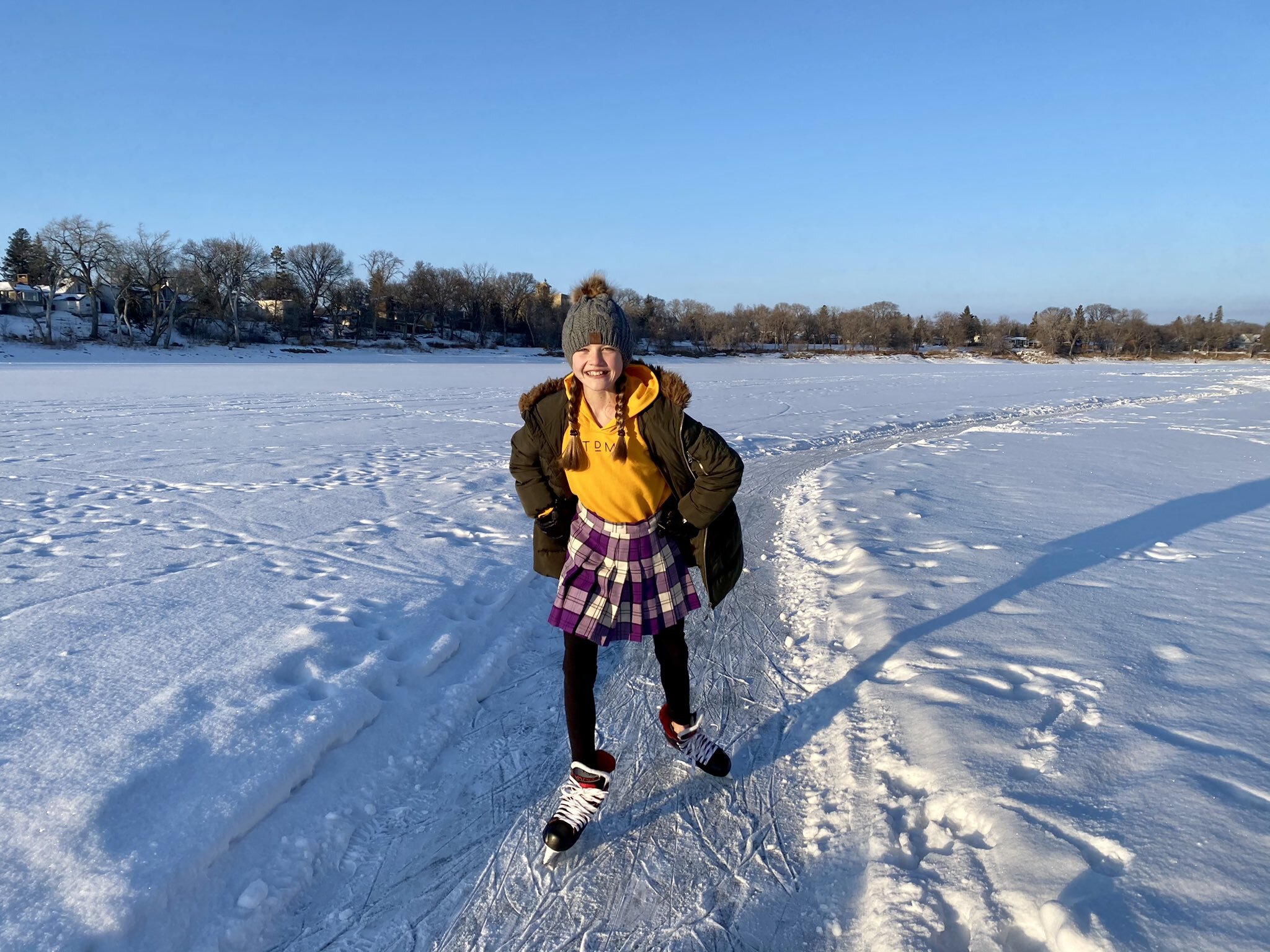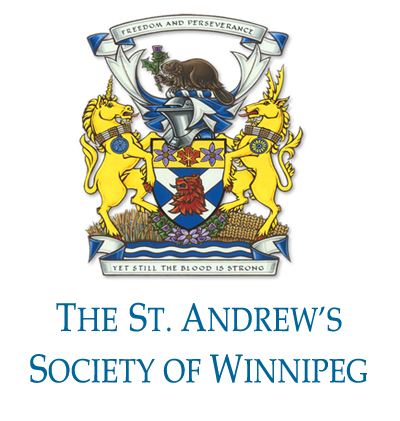The 2021 Kilt Skate Capital of Canada
/It’s been an extraordinary year. The COVID pandemic shut down all plans for community kilt skate events, but something beautiful emerged as a result: the "Home Edition” kilt skate, where individuals, families, and small groups of friends got together on rinks, ponds and rivers all across Canada. We even received a photo of kilt skating on a frozen road! You can see it, and all the other Home Edition photos at the Gallery of the Scottish Society of Ottawa webpage.
The idea of a series of dozens of “micro-kilt skates” began to take shape in the autumn of 2020, and by December it was fully developed as The Great Canadian Kilt Skate — Home Edition. The idea quickly caught on. Between December 31 and February 28, we received photos and videos from many places that had not hosted a kilt skate in the past. The communities included Moncton, New Brunswick…
Mauricie, Quebec…
Regina, Saskatchewan…
Almonte, Ontario…
Portland, Ontario…
Victoria Harbour, near Midland, Ontario…
and on Lake Darlymple, near Orillia, Ontario…
Even in the cities, like Calgary, that had been hosting kilt skates since the beginning, the Home Edition brought forward proud Scots-at-heart who had never attended a kilt skate community event before, but were very happy to display the tartan on their local ice.
Glengarry which over the past two years had earned the Kilt Skate Capital laurels — first in North Glengarry Township (2019 Kilt Skate Capital), and then in South Glengarry (2020 Capital) — rallied supporters to the Home Edition through extensive media coverage. In fact, a story in the Cornwall Standard-Freeholder was picked up by the PostMedia papers across Canada.
Glengarry has a very innovative kilt skate community. In 2018, North Glengarry held the first indoor kilt skate and by 2020 not only had this idea spread to other cities, but South Glengarry pushed the idea further by making the kilt skate the centrepiece of a full winter carnival. This year, it was the organizers in North Glengarry who suggested the name “Home Edition” to replace the clinical-sounding “micro kilt skates” that had been used when first sketching out the plans for this season. The innovation continued as North Glengarry used the kilt skate to promote the local artist community.
Montreal was named the Kilt Skate Capital in 2017. This year, Montrealers responded enthusiastically to the Home Edition, taking advantage of the city’s many community rinks as well as back yard rinks.
The kilt skate originated in Ottawa, where the Sottish Society of Ottawa hosted its first event and organized the first national event in 2015 to celebrate the bicentennial of Sir John A. Macdonald. Home Edition kilt skaters took advantage of the cities many venues, including the Rideau Canal Skateway, the Rink of Dreams at City Hall, many community rinks, as well as frozen ponds, lakes and rivers.
The Scottish Society of Ottawa’s Director of Volunteers, David Johnston, became a one-man road show to promote kilt skating — taking his kilts, skates, saltire and sometimes his pipes to ice surfaces throughout the city and beyond. He even began a new tradition: kilt roller-blading.
The 2016 Kilt Skate Capital was Saskatoon, and the Highland dance association that has organized the community kilt skates over the years got the girls together again for a Home Edition event.
In 2018, Toronto was declared the Kilt Skate Capital with one of the biggest kilt skates ever at Nathan Phillips Square. This year, people across the Greater Toronto Area responded to the opportunity to skate on local ice.
Like other kilt skate “partner cities,” Toronto’s organizer, the Clans and Scottish Societies of Canada, worked with the Scottish Society of Ottawa to promote the kilt skate with Facebook ads funded through partnership with the Scottish Government. This partnership promotes the #ScotlandIsNow campaign which portrays a dynamic, modern Scotland as a great place, not only to visit, but in which to live, work, study and invest. Toronto also broke new ground this year by organizing a Kilt Skate Zoom & Facebook Party that may well become a standard feature of the kilt skate season — along with the Home Edition itself.
To sum up: many former kilt skate capitals and many new communities responded to the challenge of the Great Canadian Kilt Skate — Home Edition. But there was one city that was a standout this year. For one thing, it sent us more pictures than any other community.
Families sent us photos from the ice just beyond their doorstep.
Others decided that, in addition to skating to celebrate Scottish heritage, it was also possible to make a tartan statement while skiing…
…and snowshoeing.
The 2021 Kilt Skate Capital has a river you can skate away on — in fact, two rivers.
And you can skate on those rivers by day…
…or night.
Actually, there’s three rivers to skate away on.
It has quirky skate venues associated with its public buildings.
There’s also a frozen duck ponds open for skating.
There’s plenty of home-made backyard rinks that people put to good use.
And as we saw at the beginning of this blog, you can even skate on the roads.
Kilt skating in this year’s Kilt Skate Capital of Canada is an enthusiasm shared by many.
… including a local Member of the Legislative Assembly, who marked Robbie Burns Day by kilt skating.
And all of this took place, we hasten to add, during a particularly cold prairie winter!
When it has held community events in the past, this city gets anywhere between 20 and 40 people — sometimes on the duck ponds, more recently in the hockey arenas. This year, according to the photo evidence on the Scottish Society of Ottawa’s Kilt Skate Gallery, the Home Edition of individual and small-group skating in this city attracted: six families, five duos, four skiers, two snowshoe-ers, and 12 single participants. And that’s just the people who sent us photos.
Let us point out the achievement of just one of those individuals: Cathy Laver-Wright, who took over responsibility for the Great Canadian Kilt Skate for the St. Andrew’s Society, personally logged 61 skates this winter, 20 of which she wore her kilt or brought her kilt skate flags or a combination of both.
Cathy reports that, “From what we could tell/count, we had 55-60 people participate in the Home Edition. Approximately 15-20 of these people had not participated in Kilt Skate in the past.”
In addition to all this, Cathy was an excellent ambassador for the Great Canadian Kilt Skate in the local media. She was interviewed by the Winnipeg Free Press and by Nadia Kidwai on CBC Radio. On Robbie Burns Day, Cathy was interviewed by CTV Television under the title “How You can help Winnipeg become Canada’s Kilt Skate Capital.” Her message: you don’t have to be Scottish to kilt skate. “You only have to have Scottish spirit, which all of us have inside us.”
And so it is with great pride in the work Cathy has done, and great respect for the “thrawn” qualities of the people of Manitoba that we declare Winnipeg to be the 2021 kilt Skate Capital of Canada.

